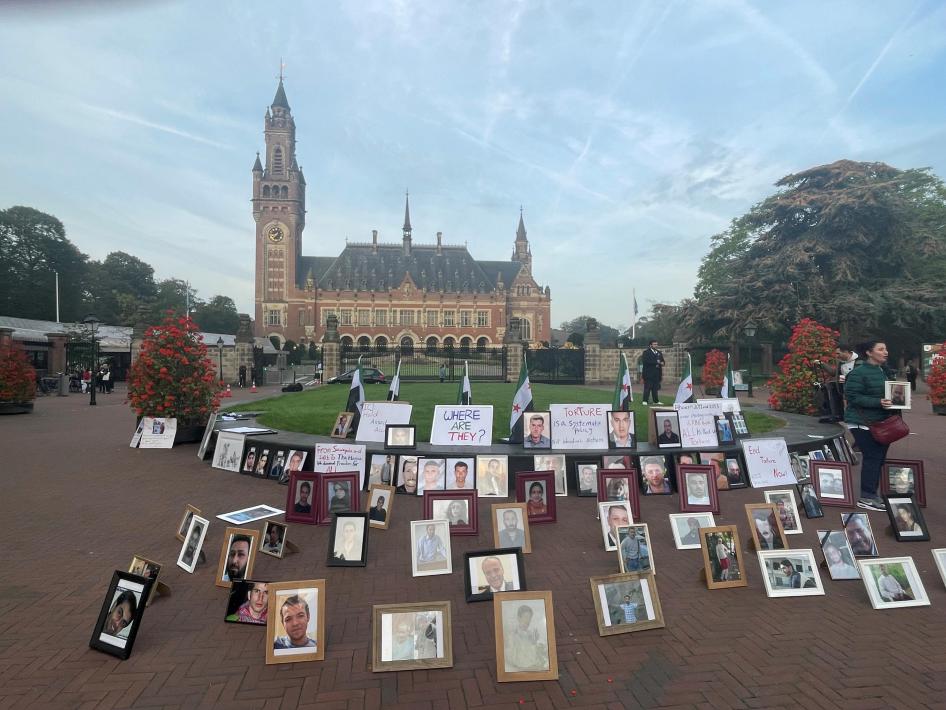(The Hague) – The International Court of Justice (ICJ) order on November 16, 2023, directing Syria to take all measures within its power to prevent acts of torture and other abuses is a milestone toward protecting civilians in the country, Human Rights Watch said today.
On June 8, 2023, the Netherlands and Canada filed a case alleging that Syria is violating the international Convention Against Torture. All three countries are party to the treaty. The case is not a criminal proceeding against individuals but seeks a legal determination of state responsibility for torture. The November 16 order responds to the Netherlands’ and Canada’s request for what are known as “provisional measures,” aimed at stopping ongoing violations and supporting steps necessary for future proceedings. It is legally binding on Syria.
“The World Court’s landmark order requires Syrian authorities to prevent acts of torture against its own citizens,” said Balkees Jarrah, associate international justice director at Human Rights Watch. “With systematic and widespread torture still a reality in Syria, the implementation of this ruling will be a matter of life or death for many Syrians in detention centers across the country.”
The ICJ’s provisional measures order directs the Syrian government to:
take all measures within its power to prevent acts of torture and other cruel, inhuman or degrading treatment or punishment and ensure that its officials, as well as any organizations or persons which may be subject to its control, direction or influence, do not commit any acts of torture or other acts of cruel, inhuman or degrading treatment or punishment.
The court also ordered Syria to “take effective measures to prevent the destruction and ensure the preservation of any evidence related to allegations of acts within the scope of the Convention.”
In reaching its decision the ICJ considered various reports by the United Nations Commission of Inquiry on Syria, which concluded that there were “reasonable grounds to believe that the [Syrian] Government continued to commit acts of torture and ill treatment.” Although the Netherlands and Canada requested it, the court did not order Syria to report on the implementation of the measures.
The World Court will now work toward a full hearing of the case on the merits. The case may take several years to reach a resolution. The provisional measures order does not prejudge the merits of the allegations that Syria has violated provisions of the Convention Against Torture.
The court held hearings in October on the request for provisional measures. At those hearings, the Netherlands and Canada presented the court with detailed allegations over Syria’s violation of the convention, citing unlawful treatment of detainees, inhumane detention conditions, enforced disappearances, sexual and gender-based violence, violence against children, and the use of chemical weapons.
Lawyers for the two governments described a number of abuses amounting to various forms of torture in a network of security, intelligence, judiciary, and health care facilities under the Syrian government’s authority. They also pointed to the absence of any indication that the Syrian authorities are trying to prevent, investigate, or put an end to these practices. The lawyers emphasized the long-lasting physical and mental harm caused by torture on survivors and victims’ families.
While it requested a three-month postponement to facilitate its participation, Syria ultimately did not participate in the hearings. Instead, Syria submitted a letter on October 10th outlining its position for the court’s consideration. Syria has consistently denied torture allegations in spite of years of evidence reported by UN bodies and independent nongovernmental organizations, including Human Rights Watch.
Torture survivors, activists, and relatives of Syrians suspected of having been detained or forcibly disappeared by the Syrian government have expressed support for this case. More broadly, the families and activists have been at the forefront of efforts to ensure sustained scrutiny and continued efforts for accountability for grave crimes committed in Syria. These efforts include successful criminal cases bringing individuals responsible for torture and other atrocities in Syria before European courts, including in Germany, Sweden, and France.
On November 15, French judges issued arrest warrants against Syrian President Bashar al-Assad and three other senior officials on charges of complicity in crimes against humanity and war crimes over the use of chemical weapons against civilians in the town of Douma and the district of Eastern Ghouta in August 2013. Human Rights Watch has documented the widespread and systematic use of chemical weapons in Syria by the Syrian government.
Even with Syria’s record of serious crimes and without any indication that its abusive practices have ceased, several Arab countries have rushed to normalize relations with the government, including the United Arab Emirates and Jordan, without taking steps to address these abuses. In May, the Arab League readmitted Syria after suspending it in 2011 over its rights abuses.
In November, Syria took part in an extraordinary joint Islamic-Arab summit on Gaza in which participating states urged the International Criminal Court (ICC) to investigate “war crimes and crimes against humanity that Israel is committing.” Syria is not an ICC member. In 2014, Russia and China blocked efforts at the UN Security Council to give the court a mandate over serious crimes in the country.
Given Syria's dismal record on accountability for systematic and widespread torture, states should re-evaluate any move to regularize relations with Syria as long as these abuses persist, Human Rights Watch said. “After over a decade of torture by the Syrian authorities, the World Court’s order could be key to breaking the cycle of abuse and impunity that the world has watched in horror as it unfolded,” Jarrah said. “Governments should now ensure that the court’s order is enforced to stop future abuses and bring accountability.”









